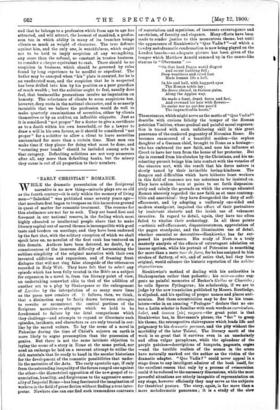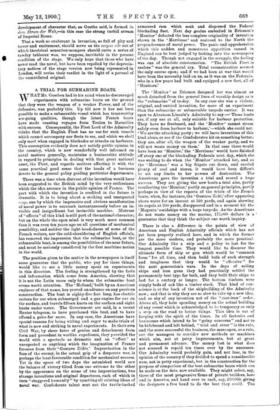" EARLY CHRISTIAN " ROMANCE.
WHILE the dramatic presentation of the Scriptural narrative is no new thing—miracle plays are as old as the fourth century—it is only within the memory of living men—" Salathiel " was published some seventy years ago— that novelists first began to trespass on this hazardous ground in quest of matter for romantic treatment. The reasons for this abstinence are not far to seek. They are based first and foremost in our national reserve, in the feeling which most highly educated or intellectual people share that to make literary capital out of sacred themes is incompatible with good taste and borders on sacrilege, and they have been endorsed by the fact that, with the solitary exception of which we shall speak later on, no novelist of the first rank has ventured on this domain. Authors have been deterred, no doubt, by a consciousness of the immense difficulty of harmonising the sublime simplicity of the original narrative with their own invented additions and expansions, and of framing fresh dialogue that will not ring false alongside of the utterances recorded in Holy Writ. They have felt that to select any episode which has been fully treated in the Bible as a subject for expansion in a novel is, from the literary point of view, an undertaking somewhat akin to that of the addition of another act to a play by Shakespeare or the enlargement of Lycidas by the interpolation of as many more lines as the poem now consists of. it follows, then, we think, that a distinction may be fairly drawn between attempts to rewrite or reconstruct the central portions of the Scripture narrative — attempts which we hold to be foredoomed to failure by the fatal comparisons which they challenge—and attempts to expand or illuminate such episodes, incidents, and characters as are only treated in out- line by the sacred writers. To lay the scene of a novel in Palestine daring the time of Christ's sojourn on earth is more likely to argue presumption than the possession of genius. But there is not the same intrinsic objection to laying the scene of a story in Rome at the same period, nor need an embargo be laid on a reverent attempt to utilise the rich materials that lie ready to hand in the secular historians for the development of the romantic possibilities that under- lie the narrative of the Acts. The early apostolic age, if only from the astounding inequality of the forces ranged one against the other—the diametrical opposition of the new gospel of re- nunciation, humility, and forgiveness to the aggressive sensu- ality of Imperial Rome—has long fascinated the imagination of workers in the field of prose fiction without finding a true inter- preter. Nowhere else can one find such tremendous contrasts
of materialism and mysticism, of insensate extravagance and
asceticism, of ferocity and elegance. Many efforts have been made to render justice to this momentous theme, bat until the appearance of Sienkiewicz's "Quo Vadis P "—of which a tawdry melodramatic condensation is now being played on the London hoards—no adequate picture has been given of the temper which Matthew Arnold summed up in the cameo-like stanzas in " Oberman " :— " On that hard Pagan world disgust
And secret loathing fell ; Deep weariness and sated lust Made human life a hell.
In his cool hall, with haggard eyes The Roman noble lay ; He drove abroad, in furious guise, Along the Appian way.
He made a feast, drank fierce and fast, And crowned his hair with flowers— :co easier nor no quicker pass'd The impracticable hours."
Theseatanzas, which might serve as the motto of "Quo Vadis?" describe with carious felicity the temper of the Roman patrician Vini tins, whose gradual and painful moral regenera- tion is traced with such unfaltering skill in this great panorama of the cankered pageantry of Neronian Rome. He becomes enamoured of a beautiful maiden—the orphan daughter of a German chief, brought to Rome as a hostage— who has embraced the new faith, and uses his influence at Court to have her torn from the house of her protector. But she is rescued from his clutches by the Christians, and his un- relenting pursuit brings him into contact with the votaries of the obscure sect, with the result that his fierce nature is slowly tamed by their invincible loving-kindness. The dangers and difficulties which have hitherto beset workers in this field of romance are too notorious to be insisted on. They have seldom been at pains to set forth dispassion.
ately and calmly the grounds on which the average educated Roman sincerely regarded the new faith as at once contemp- tible and anarchical : they have disregarded the duty of self- effacement, and by adopting a uniformly one-sided and modern standpoint, impaired the effect of their portraiture by irrelevant rhetoric and the lavish use of vehement invective. In regard to detail, again, they have too often failed to vitalise their archmology. In all these points —artistic self-effacement, dispassionateness, appreciation of the pagan standpoint, and the illuminative use of detail, whether essential or decorative—Sienkiewicz has far sur- passed his predecessors. His study of Nero is a truly masterly analysis of the effects of extravagant adulation on insane egotism, while his portrait of Petronins is something far more than a mere tour de force, for he has assigned to him strokes of flattery, of wit, and of satire that, bad they been original, would enhance the historic reputation of the arbiter elegantiarum.
Sienkiewicz's method of dealing with his authorities is Shakespearian rather than pedantic ; his vise-en-scene sug-
gests no painful memories of Becker's Gallus or Charieles ; he calls Sporns Pythagoras ; his scholarship, if we are to judge by the new translation published by Messrs. Rontledge, is slipshod, and his spelling of proper names and places anti- nomian. But these eccentricities may be due to his trans_ lators—who in an amazing "Prologue" declare that no one but a Latin scholar is familiar with such words as curriculum, habet, and innoxa [sic] corpora—the great point is that Sienkiewicz has, in Stevenson's phrase, the " fist " to grasp his theme, the retrospective clairvoyance which lends life and poignancy to his dramatis persona, and the pity without the morbidity of the later Tolstoi. The literary merit of the
work is so great that it survives even in an unscholarly and often vulgar paraphrase, while the splendour of the purple patches—descriptions of banquets, pageants, orgies —and the terrible realism of the scenes in the arena have naturally marked out the author as the victim of the dramatic adapter. " Quo Vadis I)" could never appeal in a
stage dress to any intelligent admirer of the book itself, for the excellent reason that only by a process of evisceration could it be reduced to the necessary dimensions, while the most
powerful situations are utterly incapable of representation on any stage, however efficiently they may serve as the subjects for theatrical posters. The story, again, is far more than a
mere melodramatic panorama ; it is a study of the slow
development of character that as Goethe said, is formed .in dem Strom der Welt,—in this case the strong turbid stream of Imperial Rome.
That a work so exuberant in invention, so full of pity and terror and excitement, should serve as the corpus vile out of which theatrical sensation-mongers should carve a series of tawdry tableaux was, we suppose, inevitable in the present condition of the stage. We only hope that those who have never read the novel, but have been repelled by the deprecia- tory notices of the stage version now being represented in London, will revise their verdict in the light of a perusal of the unmntilated original.







































 Previous page
Previous page